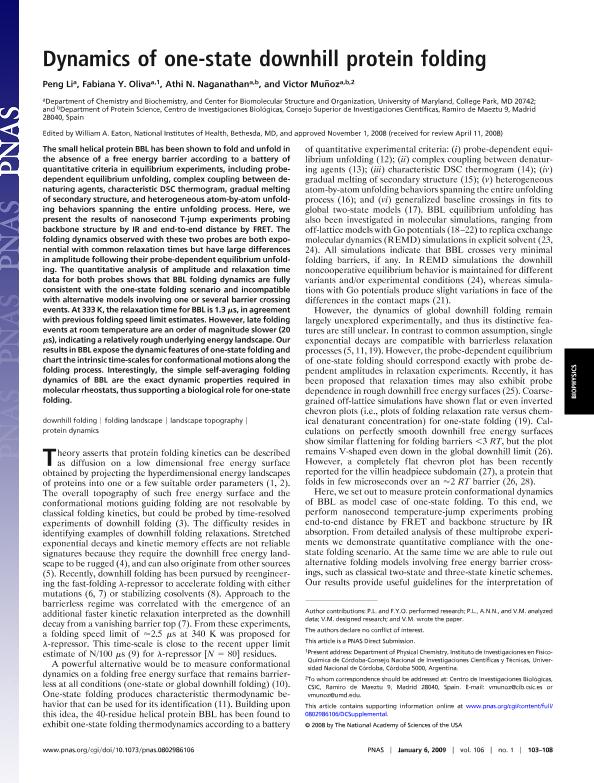Mostrar el registro sencillo del ítem
dc.contributor.author
Li, Peng
dc.contributor.author
Oliva, Fabiana Yolanda

dc.contributor.author
Naganathan, Athi N.
dc.contributor.author
Muñoz, Victor
dc.date.available
2020-09-14T18:52:24Z
dc.date.issued
2009-01
dc.identifier.citation
Li, Peng; Oliva, Fabiana Yolanda; Naganathan, Athi N.; Muñoz, Victor; Dynamics of one-state downhill protein folding; National Academy of Sciences; Proceedings of the National Academy of Sciences of The United States of America; 106; 1; 1-2009; 103-108
dc.identifier.issn
0027-8424
dc.identifier.uri
http://hdl.handle.net/11336/113961
dc.description.abstract
The small helical protein BBL has been shown to fold and unfold in the absence of a free energy barrier according to a battery of quantitative criteria in equilibrium experiments, including probe-dependent equilibrium unfolding, complex coupling between denaturing agents, characteristic DSC thermogram, gradual melting of secondary structure, and heterogeneous atom-by-atom unfolding behaviors spanning the entire unfolding process. Here, we present the results of nanosecond T-jump experiments probing backbone structure by IR and end-to-end distance by FRET. The folding dynamics observed with these two probes are both exponential with common relaxation times but have large differences in amplitude following their probe-dependent equilibrium unfolding. The quantitative analysis of amplitude and relaxation time data for both probes shows that BBL folding dynamics are fully consistent with the one-state folding scenario and incompatible with alternative models involving one or several barrier crossing events. At 333 K, the relaxation time for BBL is 1.3 μs, in agreement with previous folding speed limit estimates. However, late folding events at room temperature are an order of magnitude slower (20 μs), indicating a relatively rough underlying energy landscape. Our results in BBL expose the dynamic features of one-state folding and chart the intrinsic time-scales for conformational motions along the folding process. Interestingly, the simple self-averaging folding dynamics of BBL are the exact dynamic properties required in molecular rheostats, thus supporting a biological role for one-state folding.
dc.format
application/pdf
dc.language.iso
eng
dc.publisher
National Academy of Sciences

dc.rights
info:eu-repo/semantics/openAccess
dc.rights.uri
https://creativecommons.org/licenses/by-nc-sa/2.5/ar/
dc.subject
DOWNHILL FOLDING
dc.subject
FOLDING LANDSCAPE
dc.subject
LANDSCAPE TOPOGRAPHY
dc.subject
PROTEIN DYNAMICS
dc.subject.classification
Otras Ciencias Químicas

dc.subject.classification
Ciencias Químicas

dc.subject.classification
CIENCIAS NATURALES Y EXACTAS

dc.title
Dynamics of one-state downhill protein folding
dc.type
info:eu-repo/semantics/article
dc.type
info:ar-repo/semantics/artículo
dc.type
info:eu-repo/semantics/publishedVersion
dc.date.updated
2019-05-06T13:50:57Z
dc.identifier.eissn
1091-6490
dc.journal.volume
106
dc.journal.number
1
dc.journal.pagination
103-108
dc.journal.pais
Estados Unidos

dc.journal.ciudad
Washington DC
dc.description.fil
Fil: Li, Peng. University of Maryland; Estados Unidos. Consejo Superior de Investigaciones Científicas. Centro de Investigaciones Biológicas; España
dc.description.fil
Fil: Oliva, Fabiana Yolanda. Consejo Nacional de Investigaciones Científicas y Técnicas. Centro Científico Tecnológico Conicet - Córdoba. Instituto de Investigaciones en Físico-química de Córdoba. Universidad Nacional de Córdoba. Facultad de Ciencias Químicas. Instituto de Investigaciones en Físico-química de Córdoba; Argentina
dc.description.fil
Fil: Naganathan, Athi N.. Consejo Superior de Investigaciones Científicas. Centro de Investigaciones Biológicas; España. University of Maryland; Estados Unidos
dc.description.fil
Fil: Muñoz, Victor. Consejo Superior de Investigaciones Científicas. Centro de Investigaciones Biológicas; España. University of Maryland; Estados Unidos
dc.journal.title
Proceedings of the National Academy of Sciences of The United States of America

dc.relation.alternativeid
info:eu-repo/semantics/altIdentifier/doi/https://doi.org/10.1073/pnas.0802986106
dc.relation.alternativeid
info:eu-repo/semantics/altIdentifier/url/https://www.pnas.org/content/106/1/103
Archivos asociados
